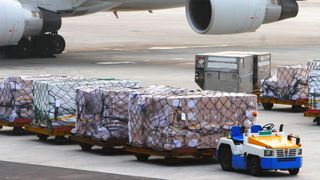Covid-19 is a crisis of globalisation, propagated by around 800,000 international flights carrying over 100 million people across borders every week, along with the cruise liners carrying half a million or so tourists in any week of the year.
The planes have now vanished from the skies and the cruise ships from the oceans, with their passengers disappearing like a swarm of bees back into their hive. International travel will be the last industry to re-emerge after the viral wave has subsided.
The crisis has also brought fresh questioning about the value of international trade and investment. For decades consumers across the world have lapped up the goods manufactured in China with unrivalled efficiency and at an unbeatable cost. Over a 20-year period, from the late 1980s to the global financial crisis in 2007–08, the blossoming of China along with many other emerging nations sent trade volumes soaring from 35% of global GDP to 60%.
It’s as if politicians have suddenly awakened from a long slumber to discover that supply lines—the arteries of globalisation—have transformed into chains of dependence.
It’s as if politicians have suddenly awakened from a long slumber to discover that supply lines—the arteries of globalisation—have transformed into chains of dependence.
As Prime Minister Scott Morrison explained earlier this month, ‘To be an open trading nation—that has been a core part, a core part of our prosperity over the centuries. But equally, we need to look carefully at our domestic economic sovereignty as well.’
He later clarified that this meant ensuring that Australia had profitable, competitive and successful domestic industries with the capability to deliver critical supplies. He indicated it also meant ‘diversifying our trade base’.
The government’s National Covid-19 Coordination Commission, established to guide its response to the crisis, has taken on the task of planning a manufacturing revival. ‘It needs to be modern, efficient, high-tech and focused on the things we need’, the commission’s chair, former Fortescue chief executive Nev Power said, adding that a lot of Australia’s manufacturing was ‘very old fashioned’ and in need of investment.
Power has asked former Dow Chemical chief executive Andrew Liveris to help craft the policy. Liveris told the Australian Financial Review, ‘Australia drank the free trade juice and decided that offshoring was OK. Well that era has gone. We’ve got to now realise we’ve got to really look at on-shoring key capabilities.’
The political momentum is probably unstoppable, but a new report from a colleague at the United States Studies Centre suggests that turning back the clock on globalisation will leave us all the poorer.
There’s a parliamentary inquiry underway considering whether Australia is too reliant on China and too dependent on foreign investment. The political momentum is probably unstoppable, but a new report from a colleague at the United States Studies Centre suggests that turning back the clock on globalisation will leave us all the poorer.
The study by USSC trade program director Stephen Kirchner explores what steps Australia should take to close the gap between Australian and American living standards and productivity. Australia has persistently lagged the United States by 15% to 20%.
There was a period in the 1990s (often attributed to the economic reforms of the Labor governments of Bob Hawke and Paul Keating) when the gap narrowed, which greatly reduced levels of industrial protection while opening Australia’s economy to global capital markets with the floating of the Australian dollar.
Those reforms exposed Australian businesses to global competition and made it possible for them to expand internationally. Without the protection of high tariff walls, the business sector had to become more productive if it was to compete.
Australian businesses proved adept at deploying developments in information technology and telecommunications in ways that boosted productivity. This was also a function of the new openness of the economy to global influence.
Kirchner says the lack of significant economic reform since the early 2000s and the growing burden of regulation in Australia relative to the US have caused the gap to widen again. He argues that it can be closed only by further exposing the Australian economy to the global economy.
As the country with the highest productivity in the world, the US doesn’t suffer from its relative insularity; however, improvements in Australia depend upon its ability to draw in the latest innovation, business practice and expertise from around the world.
The Swiss KOF Economic Institute compiles an index measuring the global connection of nations taking in such variables as ease of cross-border flows of goods, services, investment, migration and capital. Australia is middle-ranking overall, but on the economic sub-index it ranks second last, with only the US below it among the 59 nations that are tracked.
As the country with the highest productivity in the world, the US doesn’t suffer from its relative insularity; however, improvements in Australia depend upon its ability to draw in the latest innovation, business practice and expertise from around the world.
Rankings on the KOF Globalisation Index have an established cross-country relationship with living standards. Kirchner estimates that a 1 percentage point improvement on the index would lift Australia’s productivity by 0.3%.
If Australia matched the global exposure of Germany or the UK, which rank 23rd and 24th on the index, its productivity would be 5 percentage points higher, closing around a third of the gap with the US.
Failure to converge? The Australia-US productivity gap in long-run perspective

The study also observes that for every percentage point gain in US productivity, Australia’s productivity gains 0.95 percentage points. While we largely track the US, we never catch up.
He notes that Australia’s high migration levels, at least until the Covid-19 crisis, have contributed to productivity. More than half the increase in Australian graduates since 2013 hold degrees from overseas universities or are non-citizen holders of Australian degrees. That addition to Australia’s human capital has come without any investment from Australian taxpayers.
Kirchner argues that government policy should aim to place the economy at the frontier of globalisation if Australia is to catch up with the US. ‘Increased foreign direct investment, freer digital commerce and increased immigration offer significant and under-appreciated productivity benefits that require few changes in legislative or policy frameworks to capture.’
In the midst of the Covid-19 pandemic, public policy is heading in precisely the opposite direction. Having accepted a dramatic fall in economic activity and living standards as a necessary price for combating the virus, it may be that politicians are prepared for further sacrifices in the cause of economic sovereignty.






